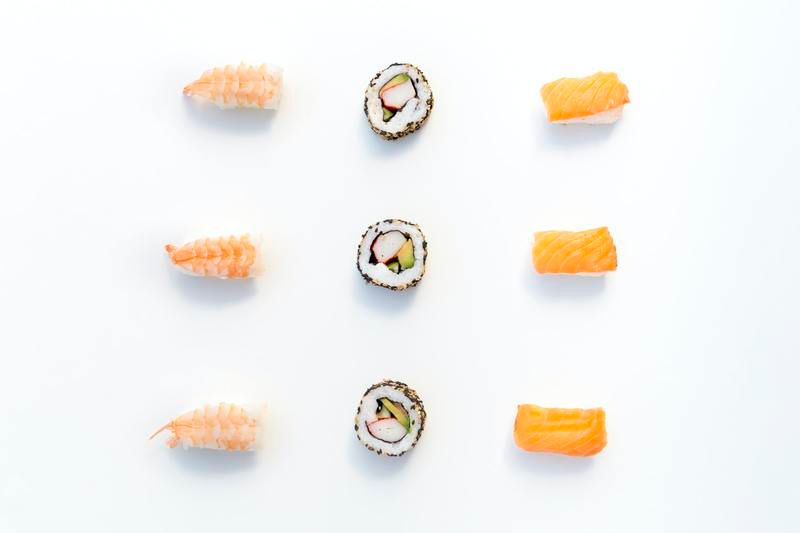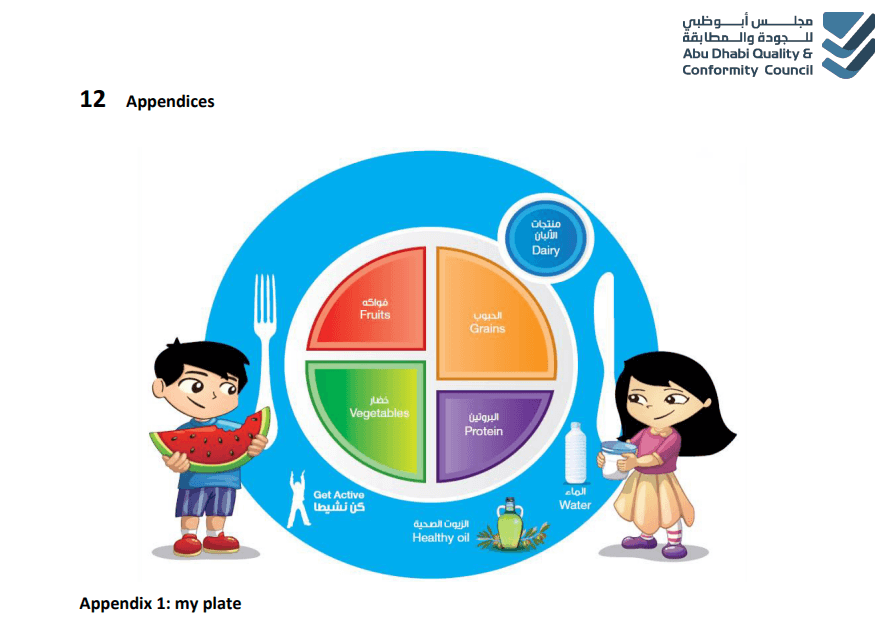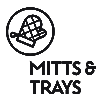Let's talk Sushi - Nutrition Facts in Top Sushi Ingredients

White Rice
The main ingredient of sushi, which has been refined and stripped of almost all fiber, vitamins, and minerals.
Kcal 129(100G): Protein –2.66G, Carbs – 27.9G, Fats – 0.28G
Tips and Comments:
- Recommend to be prepared with brown rice instead of white rice, it can increase its fiber content and nutritional value.
- Rolls can be prepared with less rice content and more vegetables instead to increase the nutrient content.
Salmon
The most commonly and popular ingredient found in sushi. It is a good source of protein, iodine, and multiple vitamins and minerals.
Kcal – 206 (100G): Protein – 22G, Carbs - 0G, Fats – 12G
Tips and Comments:
- It is a nutrient-dense fish has omega-3s, high-quality protein, and rich micronutrients.
Tuna
One of the most popular types of fish found in sushi aside from salmon. It has a firm, but tender, texture and mild, but fresh flavor. It includes omega-3 fatty acids, which gives balance in the blood vessels therefore decreasing cholesterol in the arteries.
Kcal: 130 (100G): Protein – 29G, Carbs – 0G, Fats – 0.6G
Tips and Comments:
- It is safe to eat in certain amounts. Eating large amounts of tuna is not advisable since it has a large amount of mercury in it.
- It can perform as a neurotoxin and has an effect with the brain and nervous system
Wasabi
Without this ingredient, sushi will not be sushi. It is often served alongside sushi and has a strong flavor. It’s only eaten in small amounts. It is made from the grated stem of (Eutrema japonicum), which belongs to the family of mustard, cabbage and horseradish.
Kcal – 109 (100G): Protein – 4.8G, Carbs - 24G, Fats – 0.6G
Tips and Comments:
- These ingredient have antibacterial, anticancer and anti-inflammatory properties
- It is naturally rich in vitamin C. Uniquely has an antioxidant chemical named 6-methylthio hexyl isothiocyanate, which has its typical health benefit.
Seaweed
Nori is a type of seaweed used to roll sushi. It contains many nutrients, including calcium, iron, sodium, iodine, magnesium, phosphorus thiamine, and vitamins A, C, and E.
Kcal – 38 (100G): Protein –2.48G, Carbs – 8.43G, Fats – 0.26G
Tips and Comments:
- It may also offer composites that fight viruses, inflammation,and even cancer. Nevertheless, the levels of these composites are perhaps too low to have any related health effects.
Pickled Ginger
It’s sweet, pickled ginger, also known as Gari, often used to cleanse your appetite between the pieces of sushi. It is a good source of potassium, manganese, magnesium and copper.
Kcal – 72 (100G): Protein – 0G, Carbs – 17G, Fats – 0G
Tips and Comments:
- Studies show that ginger may improve memory and help reduce nausea, muscle, arthritic and menstrual pain, and even LDL(Low- Density Lipoprotein cholesterol) (bad) cholesterol levels.
Soy Sauce
This is a common condiment to Asian cuisine. This has to be one of the required ingredients in sushi partnered with wasabi. It's a good source of sodium and it has anti- allergenic and antioxidant properties according to the study.
Kcal – 53 (100G): Protein – 6.28G, Carbs – 7.61G, Fats – 0.04G
Tips & Comments:
- It is a salty condiment made through fermentation of soybeans and wheat. Too much use of this is not advisable but a good replacement for salt.
Cucumber
It has a mild and refreshing taste and high in water content. It can help relieve dehydration and is good to eat in hot weather or after workout. Cucumbers provide various nutrients such as calcium, potassium, Vitamin K, iron, Fiber, Folate and magnesium. It is low in calories, fat, cholesterol, and sodium.
Kcal – 15 (100G): Protein – 0.7G, Carbs – 3.6G, Fats – 0.1G
Tips and Comments:
- Constant eating of cucumber will help you to have a healthy bone and it will prevent cancer. It may help lower blood sugar or stop blood glucose from rising too high.
Roe
This fun ingredient in sushi which is also known to “pop” in the mouth. It is considered as exotic luxury food. It has an excellent source of omega-3 fatty acids.
Kcal – 150(100G): Protein – 26G, Carbs – 0G, Fats –5.1G
Tips and Comments:
- Eating too much fish egg (Caviar) is not recommended since it is high in cholesterol and sodium.
Shrimp
It is one of the most common ingredients in sushi. It is relatively nutritious with high amounts of certain nutrients, such as iodine, that aren’t abundant in other ingredients.
Kcal – 119 (100G): Protein – 23G, Carbs – 1.5G, Fats –1.7G
Tips and Comments:
- Eating excessive amounts of shrimp is not advisable since it has high cholesterol content. Shrimp is high in cholesterol, but it also contains nutrients including antioxidants and omega-3 fatty acids, which have been shown to promote heart health. Research on shrimp has also shown positive health effects.
Please be reminded that the above lists are just suggested and commonly ingredients of sushi but subjected to vary depending on the restaurant's preparation. The figures are estimated according to the size and amount of each ingredient.
To understand what are the best ingredients to use for maximum nutrition benefits and also calculate calories and macros of the recipes at your food establishment / sushi joint / restaurant - contact NutriCal.
Email us on info@nutrical.co or call / whatsapp us on + 971 52 994 1190 for more information.
Government Partnership
Coming Soon
Frequently Asked Questions
NutriCal provides comprehensive nutritional analysis beyond calorie counts, encompassing allergens, meal types, and customized food labels. You can also effectively manage recipes, tailor menus, and generate insightful reports.
NutriCal is an online platform accessible from anywhere with an internet connection. Our services have a global reach, with a strong focus in the GCC region.
NutriCal collaborates with a diverse range of establishments, including food brands, suppliers, retail chains, and restaurants in the GCC.
Absolutely! NutriCal offers a complimentary trial period. Reach out to us to initiate your trial experience on our platform.
For detailed pricing information, please get in touch with our dedicated sales team. Our pricing plans are flexible and tailored to suit your specific business requirements.
We provide both monthly and annual subscription plans, granting you the choice to select the payment option that aligns best with your preferences.
NutriCal allows seamless integration of missing ingredients through credible data sources, ensuring a complete and personalized database.
NutriCal's data originates from reputable sources such as USDA and undergoes rigorous theoretical analysis, ensuring utmost precision in nutritional calculations.


















